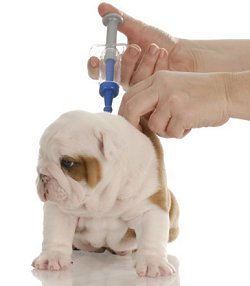Do you have a new puppy, and it's time to take him to the vet for his shots? Or do you have an adult dog and it's time for booster shots?
I'm glad you're reading this page! The right vaccinations will help protect your dog's health – but unnecessaryvaccinations can DAMAGE your dog's health.
Let's talk about this.
Only a few years ago, it was considered mandatory to bring your adult dog to the vet every year for his "booster" shots. And we've also been told that it's a good idea to get all of Jake's puppy shots rolled into a 7-in-one mega-injection....then repeat it after a few weeks....and then again after another few weeks. After that, we were told he'd need his yearly "booster" to keep him "current."
We knew it must be true because the vets told us so. So did the vaccine manufacturers. The fact that veterinarians and vaccine manufacturers have a strong financial incentive for urging us to get lots of shots for our dogs didn't seem to occur to us.
But times have changed. We consumers have our eyes open now. We know that what pharmaceutical companies, doctors, dog food companies and, yes, vets say is usually biased by what's in it for them.
For many years we've been misled about vaccinations. I'm not alone when I say so. Let's see what other experts – leading vets and researchers – have to say about vaccinations.
 We'll start with Dr. Christina Chambreau DVM:
We'll start with Dr. Christina Chambreau DVM:
"Would you rebel if your doctor told you to get measles, mumps, rubella, diphtheria, pertussis, and hepatitis shots every year of your life until you died, instead of only a few doses as a child?"
People don't need yearly revaccinations.
And veterinary immunological researchers now tell us:
Neither do dogs and cats.
And veterinary immunological researchers now tell us:
Neither do dogs and cats.
Kirk's Current Veterinary Therapy (the veterinarian's "bible") says....
 "A practice that was started many years ago that lacks scientific validity or verification is annual revaccinations. Almost without exception there is no immunologic requirement for annual revaccination. Immunity to viruses persists for years or for the life of the animal. Only the immune response to toxins requires boosters (e.g. tetanus toxin booster, in humans, is recommended once every 7-10 years) and NO toxin vaccines are currently used for dogs and cats."
"A practice that was started many years ago that lacks scientific validity or verification is annual revaccinations. Almost without exception there is no immunologic requirement for annual revaccination. Immunity to viruses persists for years or for the life of the animal. Only the immune response to toxins requires boosters (e.g. tetanus toxin booster, in humans, is recommended once every 7-10 years) and NO toxin vaccines are currently used for dogs and cats."
That article was written by Dr. Ronald Schultz Ph.D. (immunologist and Chairman of the Department of Pathobiological Sciences, University of Wisconsin School of Veterinary Medicine) and Dr. Tom Phillips DVM Ph.D.
That ground-breaking article revolutionized our guidelines for vaccinating our pets.
Let's look at each sentence to be sure we understand.
Let's look at each sentence to be sure we understand.
- A practice that was started many years ago that lacks scientific validity or verification is annual revaccinations.
- Almost without exception there is no immunologic requirement for annual revaccination.
- Immunity to viruses persists for years or for the life of the animal.
- Only the immune response to toxins requires boosters (e.g. tetanus toxin booster, in humans, is recommended once every 7-10 years) and NO toxin vaccines are currently used for dogs and cats.

A vaccine is a diluted version of a disease such as distemper or parvovirus. A vaccine shows your dog's immune system what that disease looks like, so the immune system can create antibodies against it.
In plain English, this means the immune system has a "memory." Indeed, the immune system contains memory cells. Once those memory cells have been shown what to do against a particular disease (by one successful vaccination), those memory cells will produce antibodies against that disease whenever they encounter it in real life – for years and years, probably for life.
Annual reminders are not needed. In fact, annual reminders are useless, because . . .
 That same article by Drs. Schultz and Phillips
That same article by Drs. Schultz and Phillipsgoes on to say:
"Furthermore, revaccination fails to stimulate a secondary response as a result of interference by existing antibodies."
Again, in plain English....booster shots don't work when your dog's system already has antibodies from previous vaccinations. Existing antibodies neutralize the booster shot.
So repeating vaccinations doesn't "boost" your dog's immunity.Indeed, re-vaccinating an already-immune dog offers no benefit, because the previous immunity inactivates the vaccine.
In fact, annual booster shots are harmful
You might be thinking, ""Well, even if yearly shots aren't necessary, they don't do any harm, right?"
Unfortunately, that's not true.
 Listen to what Dr. Charles Loops DVM has to say about the power of vaccines:
Listen to what Dr. Charles Loops DVM has to say about the power of vaccines:
"The first thing that must change is the myth that vaccines are harmless.Veterinarians and animal guardians have to realise that they are not protecting animals from disease by annual vaccinations, but in fact, are destroying the health and immune systems of these same animals they love and care for."
 Dr. Christina Chambreau DVM agrees:
Dr. Christina Chambreau DVM agrees:
"Routine vaccinations are probably the worst thing that we do for our animals. They cause all types of illnesses. Repeating vaccinations on a yearly basis undermines the whole energetic well-being of our animals. Veterinary immunologists tell us that vaccines need only be given once or twice in an animal's life. First, there is no need for annual vaccinations and, second, they definitely cause chronic disease."
 Dr. Roger DeHaan DVM has this to say:
Dr. Roger DeHaan DVM has this to say:
"We have been destroying the immune system. Over the years it has become increasingly clear that some vaccines are ineffectual or unnecessary, and some vaccines are dangerous, even causing symptoms of the disease they are supposed to prevent."
You might breathe a sigh of relief that your dog has "breezed through" his vaccinations with no immediate reactions. But in reality, you have no idea what is going inside him. The real problems may surface next month or next year.
 Dr. Pedro Rivera DVM agrees that excessive vaccinations cause chronic disease:
Dr. Pedro Rivera DVM agrees that excessive vaccinations cause chronic disease:
"Vaccinosis is the reaction from common innoculations. Reactions might take months or years to show up. In our practice, we've seen hypothyroidism, ear infections, immune-system diseases, joint maladies, and behavioral problems as reactions to over-vaccination."
Please read that quote again. It's important to realize that too many vaccinations can cause problems seemingly unrelated to the purpose of the shot, and that the problems can emerge long after the shots were given. Not only can Jake's immune system be compromised, but so can virtually any other part of his body. Joint problems? Behavioral problems? Cancer? Yes, and that's just the tip of the iceburg. From vaccinations.
 Dr. Charles Loops DVM says:
Dr. Charles Loops DVM says:
"Vaccinations represent a major assault on the immune system, [which] causes irregularities and abnormalities in the immune system, which then manifests as chronic diseases. What we are now seeing are generations of over-vaccinated animals."
So why are veterinarians still vaccinating every year?
Well, not all of them are. The majority of vets who practice holistic, alternative, or integrated medicineare not vaccinating every year. And some vets who practice conventional medicine take a step in the right direction by vaccinating every three years instead of every year.
But the majority of conventional veterinarians still insist that your dog come in every year for his "annual shots." Why do they do this? Well, remember that ground-breaking article we discussed earlier – the one written by Drs. Schultz and Phillips, whose research proved that dogs do not require "booster" shots? That article ends with a closing bombshell that reveals the real reason why so many vets continue to insist that dogs require annual vaccinations:
Drs. Schultz and Phillips write: "The practice of annual vaccination in our opinion should be considered of questionable efficacy unless it is used as a mechanism to provide an annual physical examination." (boldface mine)
 In other words, your veterinarian gets pets into his office by declaring that they need yearly shots.
In other words, your veterinarian gets pets into his office by declaring that they need yearly shots.
Remember that veterinarians are running a business, which needs to make money. Pets get sick on an irregular basis – can't count on that. Annual shots bring income in on a regular basis. And profit margins from vaccines are high, plus you pay for the office visit, and if you pick up heartworm and flea preventative while you're there, and maybe a bag of kibble....obviously it is in your vet's best financial interest that you bring your dog in every year.
Now don't get me wrong – regular physical exams can be a good thing, especially for older dogs. The vet can listen to their heart and do bloodwork to monitor their kidneys and liver. If you live in an area where heartworm is prevalent, your dog needs a yearly blood test. Once you find a good vet, you DO need to support him, else how can be stay in business?
But you mustn't compromise your dog's health by agreeing to vaccines that are unnecessary and harmful. And vets KNOW this. They must stop using the false pretext that "yearly shots are necessary" just to lure us into their offices.
Let's let the AVMA Journal sum this up
The American Veterinary Medical Journal (#208) says:
"There is no scientific data to support a recommendation for annual administration of vaccines. Furthermore, repeated administration of vaccines may be associated with a higher risk of anaphylaxis and autoimmune diseases."
The American Veterinary Medical Journal (#208) also says:
"There is little scientific documentation that backs up label claims for annual administration of most vaccines. In the past, it was believed that annual vaccination would not hurt and would probably help most animals. However concerns about side effects have begun to change this attitude. The client is paying for something with no effect or with the potential for an adverse reaction."
 Dr. Don Hamilton DVM warns you NOT to fall for the guilt trip pushed on you by many vets:
Dr. Don Hamilton DVM warns you NOT to fall for the guilt trip pushed on you by many vets:
"Another trend of the past few years," says Dr. Hamilton, "is coercion of guardians into procedures such as vaccination. This coercion may be blatant, such as refusal to provide services, even emergency care, unless the animal is 'current' on vaccines.
Sometimes even critically ill animals are vaccinated upon admission for treatment.
More subtle means include induction of fear and/or guilt by asserting (as an authority figure) that companion animals are at risk if not vaccinated yearly, and that failure to comply is evidence of lack of caring.
Tactics such as this can create feelings of guilt in the guardian, leading to a fear-based decision to vaccinate an animal that is not at risk. This is unethical, if not outright malpractice, and refusal is an acceptable response."
Sometimes even critically ill animals are vaccinated upon admission for treatment.
More subtle means include induction of fear and/or guilt by asserting (as an authority figure) that companion animals are at risk if not vaccinated yearly, and that failure to comply is evidence of lack of caring.
Tactics such as this can create feelings of guilt in the guardian, leading to a fear-based decision to vaccinate an animal that is not at risk. This is unethical, if not outright malpractice, and refusal is an acceptable response."

Sad to say, most vets are still ignoring current research about which vaccinations (and how many, and when they should be given) your puppy really needs.
Puppy owners beware...
Those of you with a new puppy might be thinking, "OK, I'm convinced that vaccinations don't need to be made "current" every year. And I understand that extra shots harm a dog's immune system and undermine his long term health. That's what the experts say. But my new puppy needs to get his full battery of shots so he'll be immune in the first place. Right? You're not going to tell me to skip vaccinations altogether, are you?"
No, you shouldn't skip all puppy shots. But too many shots are just as bad for a PUPPY as they are for an adult dog. And "too many" doesn't just mean how many times the vet sticks the needle into your poor little bundle of joy. "Too many" also means a multi-shot with many different diseases in the same shot.
Giving a puppy too many shots can make him sick. Sometimes a puppy will have a bad reaction immediately, or within a few days. Or sometimes he will seem fine, but in reality his immune system has been so overwhelmed that when something else comes along, he can't defeat this new challenge.
Deciding which puppy shots to give, which to skip, when they should be given, and if any of them should be repeated is not an easy and straightforward decision. There are things you have to know before you make up your mind. But make no mistake about it, YOU are the one who should be deciding, because you, more than anyone else, will have little Jake's best interests at heart.
YOU must take charge of your dog's vaccination schedule
First, consider finding a veterinarian who is practicing holistic, alternative, or integrated medicine. Most of these vets will not over-vaccinate your dog, and they'll help with other health-promoting changes in how you care for your dog.

No comments:
Post a Comment